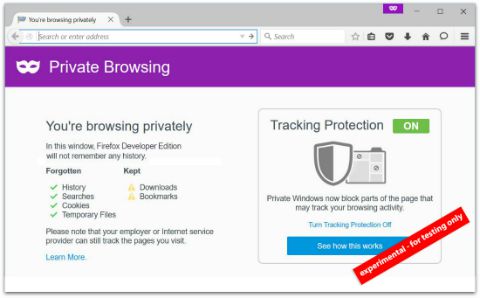 Mozilla announced last Friday that it’s released new privacy enhancements in its popular Firefox browser for pre-beta testing.
Mozilla announced last Friday that it’s released new privacy enhancements in its popular Firefox browser for pre-beta testing.
The main “experimental” feature in the Firefox developer edition – enabled by default when you open a Private Browsing window – is called Tracking Protection, which actively blocks website elements that could be used to track users.
As announced on the Mozilla blog, the Firefox team said it wants to offer users more control of their privacy, including when opening a Private Browsing window.
According to the blog post, the “private” windows offered by most browsers don’t actually provide as much privacy as users might think.
All major browsers offer some form of experience that is labeled "private" but this is typically intended to solve the "local" privacy case, namely preventing others on a shared computer from seeing traces of your online activity. This is a useful solution for many users, but we're experimenting with ways to offer you even more control when they open Private windows.
Although private browsing typically means your browser won’t “remember” your history or store cookies from that session, you can still be tracked in sneaky ways, such as fingerprinting.
Tracking Protection in Firefox attempts to counter user tracking by blocking domains and website elements – including ads, content, analytics and social media widgets – that collect data on users, often without their knowledge, in the background.

That does mean that some web pages may not render correctly, so users can disable the feature using a control center on the Tracking Protection home page by typing about:privatebrowsing in the address bar.
When Tracking Protection is turned on, users will see a shield icon in the address bar whenever Firefox is blocking domains or content.
By clicking the shield, you can disable Tracking Protection for a particular website, but opening a new Private Browsing window will automatically re-enable Tracking Protection for all sites.
This release also includes enforcement of new add-on standards.
Firefox’s add-on verification enforces standards that developers need to follow in order for browser extensions to be available in the Firefox add-on store, known as AMO.
This system seeks to prevent add-ons from changing browser settings, loading toolbars, injecting ads or malware, and other surreptitious and risky behavior.
When we asked our readers a year ago which web browser they trusted the most, Firefox was the clear winner.
With these new features, it looks like Firefox is trying to keep on top of those user polls.
Image of mask courtesy of Shutterstock.com .


Kurt S.
Mozilla is moving way too fast for comfort. While it may be laudable to include security functions in the browser, releasing a newer version every few days and NOT paying attention to the wants/desires of the user is costing them. Generating ill will is NOT a good way to gain usage share or to generate revenue.
Kyle Saia
Firefox is the best browser and this only further proves it. as long as they stay on top of the security game with moves like this i’ll continue to use it, heck i would even consider paying for it.
Paul Ducklin
You can pay for it if you want to.
Well, it’s called a “donation”, but it involves sending Mozilla some money. You can even pay using Bitcoin.
Nora
My biggest complaint with Mozilla is the crashes. Seems it crashes more and more every day. Yet no one ever gives me an answer about this issue. whenever I contact them.
Pop W.
Interesting. I’ve found Mozilla to be more stable than Chrome. I use Chrome primarily, but when it starts mucking up, I switch to Mozilla Nightly and the same website loads without a problem.
Mitch
remove/disable flash; high probability crashes disappear
Jamie
I love the first two comments here: “Firefox is terrible!” “Firefox is terrific!”
As a consumer of web content, I fall on the “terrific” side. The Tracking Protection feature is great for consumer protection, at least for those who care about it. I feel for website owners who have built their revenue model around advertising, but if you are in bed with invasive ad networks, now is the time to start transitioning away to a more sustainable financial model. Hopefully this change will help drive adoption of a micropayment system we’ve been promised for years. I’d gladly pay a cent or two to read a blog post like this. Over the course of a month all of my web activity would likely cost me less than a cup of gourmet coffee, and the best content producers would be very well compensated. Well, the ones that attract the most eyeballs I guess, but that’s a different issue.
In the meantime, because it’s a large part of what drives the economic engine of the Web, I make a concerted effort to allow non-tracking ads to be displayed to me. For example, rather than use Adblock, I’ve switched to the EFF’s Privacy Badger, which only blocks trackers by default. Firefox’s solution should do the same.
Also, the Firefox Tracking Protection is not exactly “new.” It’s been present in the past few releases, but not activated by default. I switched it on in (I believe) version 38, and have had it turned on ever since with no ill effects. This will just be the first version in which it’s enabled by default.
marrrie Caught ya
Under the guize of supporting Firefox, https://nakedsecurity. is tracking it’s readers. Installed Ghostery exposese the 9 trackers and how they spy on us!
[long copy-and-paste from Ghostery removed to save space]
Paul Ducklin
We go one better than Ghostery by listing our cookies and scripts explicity, and explaining what we use each service for:
https://nakedsecurity.sophos.com/cookies-and-scripts/
I think the word “spy” is inappropriate here, because it implies secret surveillance. We’re hardly “spying” on you if you can see all the cookies and scripts for yourself, and if we document them for you anyway :-)